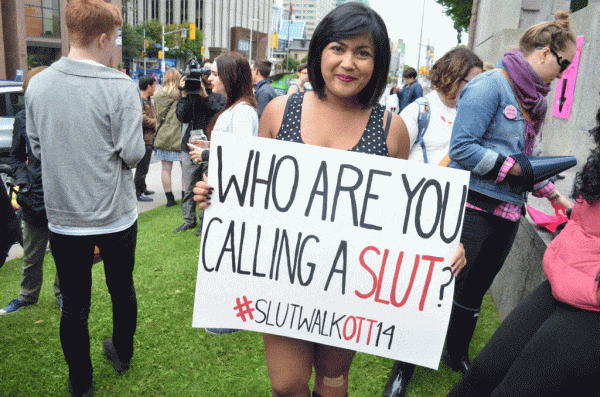By Alicia K. Gosselin

Despite the frigid air, several women stood in the crowd grinning and baring their butt cheeks.
Over 150 people showed some skin and support on Sept.14 when they strutted down Elgin Street for the fourth annual SlutWalk Ottawa – an event that challenges victim-blaming, slut-shaming and pervasive rape culture across the city.
This year’s event focussed on the fact that sexual violence comes in many forms – from verbal harassment to sexual assault.
For Lindsey Davey, a third-year early childhood education student at Algonquin, the walk is about confronting the idea that what someone wears or how they act can affect their chances of getting sexually assaulted.
“The reality is that rape has NOTHING to do with what a woman looks like or how she chooses to carry herself in public,” she said. “It’s all about power.”
The SlutWalk movement began in 2011 when a Toronto police officer told a group of women to “avoid dressing like sluts” in order to avoid being sexually assaulted.
Davey lived in Toronto at the time of the controversy and put the SlutWalk on her radar when she moved to Ottawa last year for school. She said she believes the event is also about reclaiming the word “slut.”
“When we are talking slutty people these days, we are talking people who are sex positive,” she said. “Yes, I am a slut, but I am also more than that because I am human.”
The event has expanded its reach over the past three years and continues to attract participants with very different reasons for being there.
For Melissa Ortiz, a social service worker graduate from Algonquin, attending the walk is something she does for the marginalized women she works with at the Elizabeth Frye Society of Ottawa. Often running into women who have experienced some form of sexual assault, the event is a way for her to let them know they are supported and what they went through is not their fault.
This year’s SlutWalk Ottawa coordinators, Fateema Ghani, a political science student at uOttawa, and Kayla Spagnoli, a self-proclaimed human rights activist, both said that they see the event relating to Ottawans in multi-faceted ways, especially students.
“Every year during frosh week students see more examples of how pervasive rape culture is on campuses,” said Ghani, 25, referring to the recent controversy sparked by a Carleton University frosh leader wearing a shirt that read, ‘FUCK SAFE SPACE.’
“How many isolated incidences do we need to see that this is a mass issue?”
According to a local survey conducted by Hollaback Ottawa – a SlutWalk partner and movement aimed at ending street harassment – 97 per cent of women said they have experienced some sort of street harassment in their life.
Julie Lalonde, director for Hollaback Ottawa, said the numbers aren’t surprising considering the amount of catcalls and obscenities that are often directed at women either taking a stroll or taking the bus. She explained that sexual violence is on a continuum, not a spectrum, and should be taken seriously at all levels.
“To those who say cat calls aren’t that serious – it’s all shitty and it’s all bad,” she said, to a cheering crowd. “I have a right to walk down the street without being harassed. And the amount of people who think that’s what it means to walk down the street… is devastating and we need to put an end to it.”


